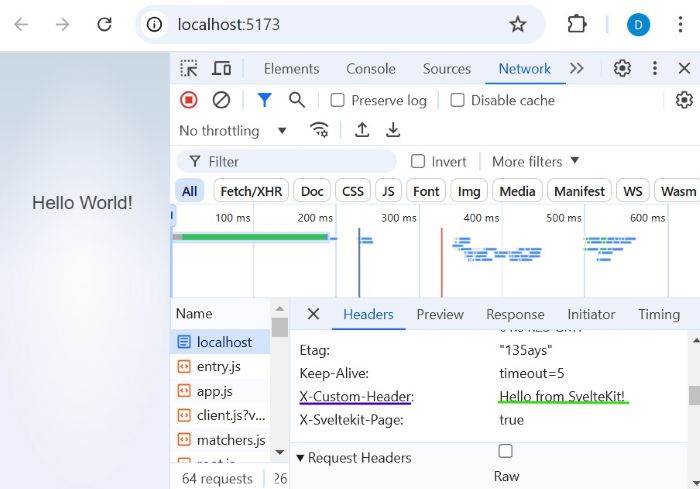
- Svelte - Home
- Svelte - Introduction
- Svelte - Installation
- Svelte - Reactivity
- Svelte - Props
- Svelte - Logic
- Svelte - Events
- Svelte - Bindings
- Svelte - Classes
- Svelte - Styles
- Svelte - Actions
- Svelte - Transitions
- Svelte - Advance Reactivity
- Svelte - Reusing Content
- Svelte - Motion
- Svelte - Advanced Binding
- Svelte - Advanced Transitions
- Svelte - Context API
- Svelte - Special Elements
- SvelteKit Basics
- SvelteKit - Introduction
- SvelteKit - Routing
- SvelteKit - Loading Data
- SvelteKit - Headers
- SvelteKit - Cookies
- SvelteKit - Shared Modules
- SvelteKit - Forms
- SvelteKit - API Routes
- SvelteKit - States
- SvelteKit - Errors
- SvelteKit - Redirects
- SvelteKit Advanced
- SvelteKit - Hooks
- SvelteKit - Page Options
- SvelteKit - Link Options
- SvelteKit - Advanced Routing
- SvelteKit - Advanced Loading
- SvelteKit - Environment Variables
- Svelte Resources
- svelte - Useful Resources
- svelte - Discussion
Sveltekit - Hooks
The Hooks in SvelteKit are essential for managing requests, responses, and data handling in SvelteKit applications. This chapter provides a brief understanding of key hooks such as handle, handleFetch, and handleError.
Handle Hooks
The handle hooks are a core concept in SvelteKit that allows developers to modify the default behavior of their applications. The handle hook is defined in the src/hooks.server.js file and enables the processing of incoming requests and returns a response.
Functionality of the Handle Hook
The handle hook processes the incoming requests and returns an apropriate response for them. It takes two parameters:
- Event Object: This object contains information about the incoming request, including the URL, headers, cookies, fetch, and other relevant details.
- Resolve Function: This function matches the request to a specific route in your application and imports the necessary code (like +page.server.js and +page.svelte files). It loads any required data, and generates a response.
Implementation Syntax
You can simply implement the handle hook using the following syntax:
export async function handle({ event, resolve }) {
return await resolve(event);
}
HandleFetch Hook
The handleFetch hook in SvelteKit allows developers to modify the fetch function that is used in server-side routes. This handleFetch hook is defined in the src/hooks.server.js file, enabling the customizations and handling of requests before they are sent to their final destination.
Functionality of the HandleFetch Hook
The handleFetch hook handles the fetch function while taking three parameters:
- Event Object: An event object contains the information about the incoming request, including headers, fetch, cookies, and URL.
- Request Object: It contains the original request object that is created.
- Fetch Function: It contains the modified version of the standard fetch API alongwith additional capabilities.
Implementation Syntax
You can simply implement the handleFetch hook using the following syntax:
export async function handleFetch({ event, request, fetch }) {
return await fetch(request);
}
HandleError Hook
The handleError hook in SvelteKit allows developers to modify the unexpected errors that occur in their application. This handleError hook is defined in the src/hooks.server.js file, enabling error handling.
Functionality of the HandleError Hook
The handleError hook enables error handling while taking two parameters:
- Event Object: An event object contains the information about the current request, including headers, fetch, cookies, and URL.
- Error Object: It contains the error object that is thrown, including stack trace and other details.
Implementation Syntax
You can simply implement the handleError hook using the following syntax:
export function handleError({ event, error }) {
console.error(error.stack);
}
Example
The following is a simple example of using a handle hook in our SvelteKit application. This example adds a custom header to the response.
<!--src/hooks.server.js-->
export async function handle({ event, resolve }) {
// Resolve the event to get the response
const response = await resolve(event);
// Add a custom header to the response
response.headers.set('X-Custom-Header', 'Hello from SvelteKit!');
return response; // Return the modified response
}
Output
